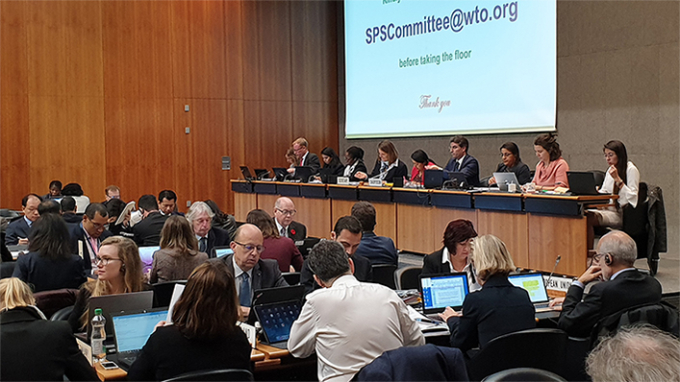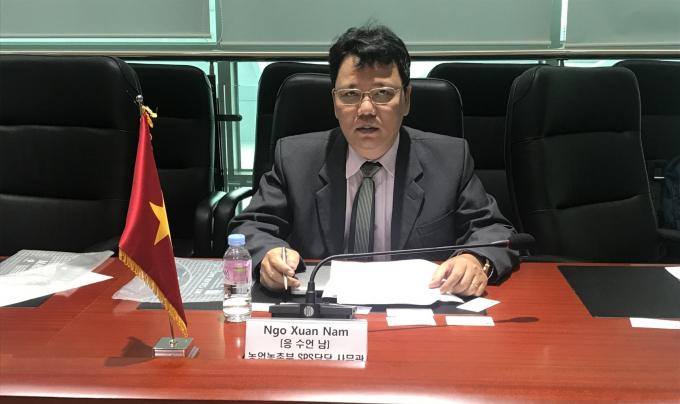June 19, 2025 | 04:22 GMT +7
June 19, 2025 | 04:22 GMT +7
Hotline: 0913.378.918
June 19, 2025 | 04:22 GMT +7
Hotline: 0913.378.918

The SPS-WTO Committee holds three meetings each year for WTO members involved in the implementation of the SPS Agreements.
The 83rd meeting of the Sanitary and Phytosanitary Committee (SPS-WTO Committee) took place on June 22-24 at WTO headquarters, Geneva, Switzerland. As per regulations, the WTO holds three meetings each year for all WTO members involved in the implementation of the SPS Agreements.
As part of the Vietnam SPS Office’s regular meeting plan in 2022 at the SPS-WTO Committee, the Vietnamese delegation is expected to participate in the meeting with three main contents:
1) Attend a thematic session on "Using remote (online) monitoring and auditing tools in management" and the workshop "Training on ePing SPS-TBT tool" - a tool that facilitates tracking sanitary and phytosanitary (SPS) and technical barriers to trade (TBT) measures.
2) Review the implementation of transparency obligations under the SPS Agreement.
3) Conduct bilateral meetings concerning urgent issues with delegations from countries including the EU, China, Saudi Arabia, Brazil, Pakistan and the UK.
To be more specific, Vietnam SPS Office will work with the EU to come to an agreement on solutions and progress so that the EU can reduce the inspection frequency for Vietnamese agricultural products and foods, especially dragon fruit, spices, okra, chili peppers and instant food.
Vietnam SPS Office will ask China for clarification regarding the criteria in Decrees 248 and 249. Both parties will coordinate to review business registration dossiers after June 2023 and open the market for some agricultural products such as durian and sweet potato.
The Vietnamese delegation will also work with Brazil on additives in fisheries products and details of heat treatment for processed shrimp products; with Saudi Arabia on reopening the market for aquaculture products such as shrimp and pangasius; with Pakistan on Aflatoxin regulation in tea; with the United Kingdom on the clarification of the new phytosanitary certificate form.

Dr. Ngo Xuan Nam, Deputy Director of Vietnam SPS Office, will represent the Vietnamese delegation to discuss at the upcoming meetings.
The two bilateral working sessions with the EU and China are receiving keen attention from Vietnam SPS Office during the upcoming business trip.
Dr. Ngo Xuan Nam, Deputy Director of Vietnam SPS Office shared, "The Vietnam SPS Office will discuss with the EU side to clarify the criteria for inspection frequency for a number of exported agricultural products and foods, as well as come to an agreement on solutions to reduce the inspection frequency, helping Vietnam’s businesses and people ensure import and export activities.”
According to Dr. Ngo Xuan Nam, regarding the occurrence of non-compliance in 2021 and the first six months of 2022, there has only one shipment of dragon fruits failed to export to the EU because Vietnam has done well in controlling MRLs and pesticide residues. This serves as a foundation for Vietnam SPS Office to request the EU to reduce the inspection frequency for dragon fruit as well as a number of other products.
Regarding the meeting with China, Dr. Ngo Xuan Nam said that the China side was about to initiate online inspections with a number of groups of items specified under Decree 249. "We will ask China to clarify the inspection contents as well as frequency to coordinate smoothly, and gain a basis to organize future dissemination to relevant agencies and manufacturing enterprises in Vietnam in order to avoid the situation of trade disruption.”
Previously on June 13th the EU announced that it would continue to maintain the requirement for an additional SPS certificate and a 20% inspection frequency for dragon fruit and instant noodles originating from Vietnam (the ingredients contain spices and some other inputs and additives).
As for other agricultural products, the EU kept a 50% inspection frequency for parsley, coriander, basil, mint, okra and chili peppers of the genus Capsicum. These regulations had been posing certain effects on exporting enterprises, cooperatives and farmers directly producing agricultural products.
Regarding the upcoming meeting, the Vietnam Fruit and Vegetables Association has just sent Document No. 31/VP-HHRQVN/22 to Vietnam SPS Office, proposing to work with the EU to reduce the sampling rate of dragon fruit and spices. According to Vietnam Fruit and Vegetables Association, the current inspection rate of 20% for dragon fruit and 50% for spices is "too harsh" and "greatly affects the profitability of businesses".
Translated by Samuel Pham

(VAN) After 5 years of implementation, the CAI initiative has helped coffee growers change their farming practices, moving toward responsible agriculture that meets global export standards.

(VAN) The primary prerequisite for the comprehensive and robust integration of Vietnam's livestock sector into the global value chain is the establishment of a disease control system.

(VAN) The results of national programs are essential for establishing a contemporary livestock sector that is well-equipped to meet the demands of both domestic and international markets, with robust biosafety standards.

(VAN) The UNESCO Global Geopark revalidation of Non nuoc Cao Bang and the transition to a two-tier administrative model are presently undergoing a pivotal moment in Cao Bang, the northernmost province of Vietnam.
/2025/06/13/5330-2-004539_953.jpg)
(VAN) Changing policy mindset and removing investment barriers are urgent requirements to open up new development space for enterprises in the agricultural sector.

(VAN) The areas include the restoration of five million hectares of marine ecosystems.

(VAN) Dr. Le Van Nguyen, Director of the Institute of E-Commerce Management (ECM), emphasizes the potential for green development through the cultivation of fruit trees, particularly in provinces such as Son La.